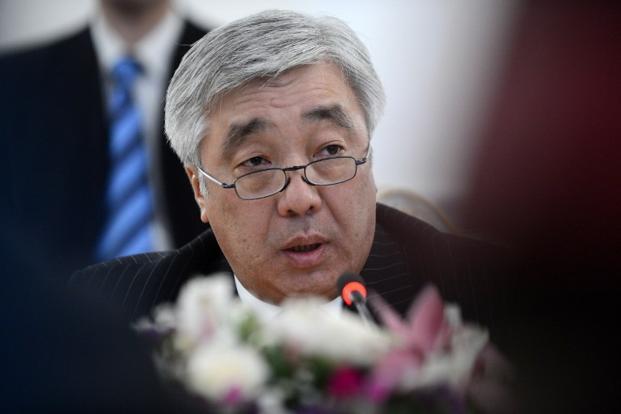
Kazakhstani Foreign Minister Erlan Idrissov Conducts Shuttle Diplomacy in Central Asia
Publication: Eurasia Daily Monitor Volume: 10 Issue: 64
By:

Kazakhstan’s mediation role in Iran, which resumes today, is not unique. Astana has striven to resolve conflicts throughout its Eurasian neighborhood. To this end, at the end of March, Kazakhstani Foreign Minister Erlan Idrissov visited Tajikistan and Uzbekistan to engage in some shuttle diplomacy to help settle their differences over Tajikistan’s controversial Rogun Dam project.
Tajikistani authorities see the dam, whose construction began in the 1980s but was then halted with the Soviet Union’s collapse, as essential for exploiting their main national resource (hydropower) for electricity generation, economic growth, and energy security and independence (Journal of Turkish Weekly, April 3, 2013). Uzbekistanis fear that it would disrupt their water supplies, ruin their agriculture and environment, and make them dependent on Dushanbe’s goodwill, since the dam would enable Tajikistan to control the flow of the Vakhsh River, which is a major tributary of the Amu Darya river, which feeds into Uzbekistan’s irrigation canals (see EDM, September 17, 2012).
During the Soviet period, the Union of Soviet Socialist Republics (USSR) State Planning Committee established annual water usage quotas for the five Central Asian republics. The Soviet authorities also treated the five Central Asian economies as an integrated network. They instructed the upstream republics of Kyrgyzstan and Tajikistan to store excess water in winter and then release it in summer to the downstream countries of Kazakhstan, Turkmenistan and Uzbekistan. The latter republics would use the water to support agriculture and cotton harvesting while compensating the upstream republics with fuel supplies (especially gas and coal) distributed through Soviet central government institutions.
The USSR’s demise—which abruptly transformed the USSR’s administrative boundaries into more rigorous national boundaries—has resulted in each newly independent Central Asia republic pursuing autonomous water policies that do not always reflect the interests of other countries. The main source of water-related tension among Central Asian countries is that Uzbekistan and Kazakhstan use Central Asian water supplies primarily to irrigate crops as well as for direct consumption. In contrast, Kyrgyzstan and Tajikistan seek to convert the region’s water resources into electricity, which strengthens their energy and economic independence, and can also help them earn foreign revenue when they sell excess electricity to neighboring countries.
The World Bank has sought to conduct expert feasibility studies assessing the technical, economic, environmental, and social impact of the project as a means of depoliticizing the Rogun conflict by making it a technical and economic issue subject to rational cost-benefit analysis. The Bank has commissioned two studies by multinational consultant firms to provide a Techno-Economic Assessment Study and an Environmental and Social Impact Assessment. The World Bank has also established two independent expert panels of recognized international professionals to ensure that the studies meet international standards of due diligence, objectivity, and credibility. (https://web.worldbank.org/WBSITE/EXTERNAL/COUNTRIES/ECAEXT/0,,contentMDK:22743325~pagePK:146736~piPK:146830~theSitePK:258599,00.html)
These studies should be completed by the end of the year. The problem is that the confrontation between Uzbekistan and Tajikistan over the dam has become so intense that the technical issues have become less important than questions of national pride, independence and security.
The United Nations has been seeking to resolve the dispute for years, though without much progress. United Nations officials recently indicated that they have been urging Kazakhstan to join their mediation efforts, which are complicated by other sources of tension between Tajikistan and Uzbekistan. Kazakhstan has good relations with both countries and also enjoys important financial and diplomatic assets in the region.
During his March 28 visit to Tajikistan, Idrissov met with President Emomalii Rahmon and Foreign Minister Hamrokhon Zarifi (Khovar, March 27). The foreign ministers discussed bilateral cooperation regarding economic, energy, humanitarian, migration, political and water issues. They reaffirmed their commitment to coordinate and mutually support their foreign policy initiatives to advance their shared interests (Khovar, March 28). They also signed a “Program of Cooperation between the Ministry of Foreign Affairs of the Republic of Tajikistan and the Ministry of Foreign Affairs of the Republic of Kazakhstan for 2013” (Trend, March 28). Idrissov told the media that, “During my meeting with [President] Rahmon, we noted that Kazakhstan and Tajikistan are important regional partners. We share common views on the future of the Central Asian region” (Trend, March 29). The two countries’ bilateral trade in 2012 amounted to more than $700 million, a 150 percent increase over 2011 (Kazakhstanskaya Pravda, March 29).
At the eleventh meeting of foreign ministers of the Asia Cooperation Dialogue member countries held in Dushanbe, which seeks to promote mutually beneficial economic cooperation in Asia and the strengthening of the region’s competitiveness in the world market, Idrissov told journalists that trans-border water-related issues were one of the most enduring sources of tension among Central Asian countries. Idrissov stressed the importance of adhering to international norms that stipulate that the rights of countries that lie in the upper and lower reservoirs are equal. “The states in the upper waters should not violate the rights and economic interests of the states located in the lower waters, and vice versa. There are international conventions according to which the two sides should sit at the negotiating table and work out a mutually acceptable scheme for the usage of water resources” (Trend, March 28).
Kazakhstan’s mediation efforts are a welcome development for the region. Central Asia lacks an effective region-wide mechanism for managing its natural resources. The International Crisis Group, the Senate Foreign Relations Committee, and other expert groups have warned this situation could worsen regional resource conflicts. Central Asia has many disputed waterways and these five countries suffer from major water shortages. Several adverse environmental trends—growing populations, regional climate change, more water-intense agricultural practices–have exacerbated this situation. Kazakhstan’s interest in regional security and stability, as well as its good relations with its neighbors may make Astana a more capable mediator in Central Asia than any outside actor could hope to be.




